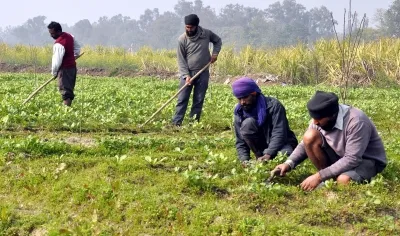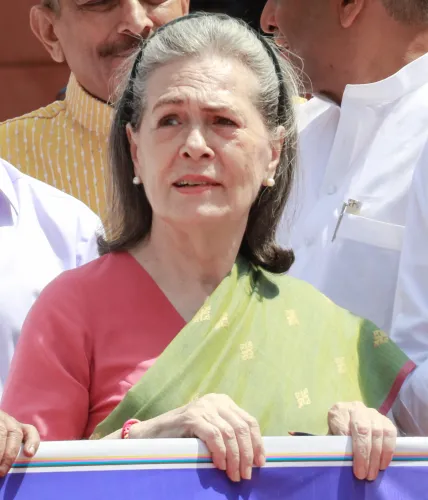Farm Sector Receives Nearly Sixfold Budget Increase Over a Decade

New Delhi, Dec 17 (NationPress) There has been an astonishing almost six-fold rise in the budget allocation for the Department of Agriculture & Farmers Welfare, soaring from Rs 21,933.50 crore in 2013-14 to Rs 122,528.77 crore for the fiscal year 2024-25, as was disclosed in the Lok Sabha on Tuesday.
Key initiatives underway for the welfare of farmers include the Pradhan Mantri Kisan Samman Nidhi (PM-KISAN), Pradhan Mantri Kisan Maandhan Yojana (PM-KMY), Pradhan Mantri Fasal Bima Yojana (PMFBY), Modified Interest Subvention Scheme (MISS), and the Agriculture Infrastructure Fund (AIF), as stated by the Minister of State for Agriculture and Farmers’ Welfare, Ram Nath Thakur, in a formal response in the Lower House.
Furthermore, the Indian Council of Agricultural Research (ICAR) has published a collection of success stories showcasing 75,000 farmers who have more than doubled their incomes through the integration of various schemes managed by the Ministry of Agriculture and Farmers’ Welfare along with allied ministries.
The minister elaborated that the AIF was initiated to tackle existing infrastructure deficiencies and to foster investment in agriculture.
The AIF serves as a medium to long-term debt financing mechanism aimed at supporting investments in viable projects related to post-harvest management infrastructure and sustainable farming assets, backed by interest subvention and credit guarantee support.
The Union Cabinet has endorsed the progressive enhancement of the AIF by broadening the range of eligible projects.
This expansion allows individual eligible beneficiaries to develop infrastructure under 'viable projects for establishing community farming assets', integrated processing projects, and alignment with PM KUSUM 'A'.
Notable projects sanctioned under the AIF comprise 18,606 custom hiring centres, 16,276 primary processing units, 13,724 warehouses, 3,102 sorting and grading units, 1,909 cold storage facilities, and approximately 21,394 other types of post-harvest management projects and community agricultural resources, he added.
The minister also pointed out that agriculture falls under the purview of the States, and thus State Governments are responsible for implementing necessary measures for agricultural development.
However, the Government of India plays a supportive role in these efforts by providing appropriate policy frameworks, budget allocations, and various schemes.
The different schemes introduced by the Centre aim at enhancing farmers' welfare through increased production, better returns, and income support.
Strategies to boost farmer incomes include enhancing crop productivity, lowering production costs, diversifying agricultural practices, adapting to climate change for sustainable farming, and compensating for losses.
Numerous reforms and policies are concentrated on elevating farmers' incomes by modernizing and rationalizing input usage to cut costs, raise production, ensure profitable returns, provide income support, and offer old-age security.









